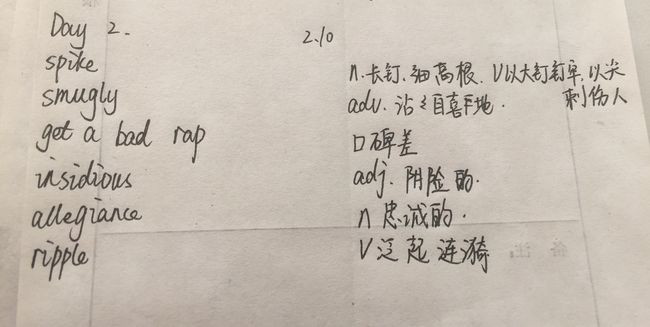今天看的文章来自《华盛顿邮报》12月18号的一篇文章。文章读懂不难,这里截取部分段落。
单词释义来自百度翻译。
Shut up,Food Snobs.Chain Restaurants Are Awesome
In America, chain restaurants get a bad rap.We blame them for the spike in obesity and the death of the family dinner. We demonize them as “the core of what is wrong with our food system.”
Today, a quarter of Americans eat organic products on a regular basis, up from 13 percent a decade ago. But we also love chain restaurants. And those elites who smugly dismiss them as disgusting or “insidious” ignore the very important role these places play in our culture and economy. Not to mention, a lot of them serve really good food.
Americans are more polarized than ever, but chains remain a common point of reference. Eight out of 10 Americans eat fast food at least once a month. Chains put us in conversation with one another. As we learned from the fans of our weekly podcast on chain restaurants, people forge fierce allegiances to their regional chains, such as In-N-Out Burger, Waffle House and L&L Hawaiian BBQ. Americans eat just 1 percent of meals at fine-dining establishments. Chains account for 88 percent of U.S. restaurant options.
Another reason to celebrate chains: They’re consistent. You know what you’re getting, whether you’re eating at the Denny’s in Alaska or Hawaii. As Bloomberg View columnist Megan McArdle wrote, chains put “a floor on quality; any family owned restaurant that cannot provide at least as good food and service as a chain has gone out of business.” If chains went away, she wrote, we wouldn’t have better food.
We know what the haters say — that chains serve meals made from low-quality ingredients. But many chains are trying to change that. And when they do make a shift to healthier, greener options, that ripples across the food industry. This year, for example, McDonald’s announced that it will stop selling meat from chickens that have been raised with antibiotics. Soon after, Tyson Foods, the country’s largest chicken processor (and a major McDonald’s supplier) decided to stop using antibiotics to raise its chickens in the United States.
So we love food, but we’re not one-dimensional meal demons. And our passion for chain restaurants is about more than just wanting to consume 1,700 calories in a single sitting. Chains are an essential component of our nation’s cultural identity. If you’re thinking of American food, you’re thinking of food that’s served at chains.
spike
英[spaɪk] 美[spaɪk]
n. 长钉; 细高跟; (防滑) 鞋钉; 尖状物;
vt. 加烈酒于; 以大钉钉牢; 用尖物刺伤; 打乱某人的计划;
[例句]Yellowing receipts had been impaled on a metal spike.
发黄的收据被穿在一根金属扦上。
[其他] 第三人称单数:spikes 复数:spikes 现在分词:spiking 过去式:spiked 过去分词:spiked
smugly
英[smʌɡlɪ] 美[smʌɡlɪ]
adv. 沾沾自喜地,自鸣得意地;
[例句]"I shall have finished my project by Monday," he would say smugly.
他会自鸣得意地说:“到下星期一我将完成我的计划”。
insidious
英[ɪnˈsɪdiəs] 美[ɪnˈsɪdiəs]
adj. 阴险的; 隐伏的,潜在的; 暗中为害的; 狡猾的;
[例句]They focus on overt discrimination rather than insidious aspects of racism.
他们关注的是公开的歧视,而不是种族主义的一些潜在问题。
allegiance
英[əˈli:dʒəns] 美[əˈlidʒəns]
n. 忠诚,拥护; (封建) 臣道,忠节;
[例句]My allegiance to Kendall and his company ran deep.
我对肯德尔及其公司的忠诚加深了。
[其他] 复数:allegiances
ripple
英[ˈrɪpl] 美[ˈrɪpəl]
vt. 使泛起涟漪; (把头发) 弄成波浪形; 使作潺潺声;
vt. 在…上形成波痕;
vi. 发出潺潺声;
[例句]You throw a pebble in a pool and it ripples
往池塘里扔块鹅卵石就会激起一片涟漪。
[其他] 第三人称单数:ripples 现在分词:rippling 过去式:rippled 过去分词:rippled
get a bad rap
口碑差
